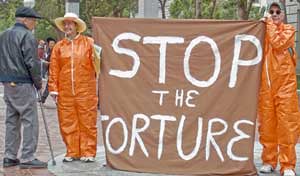
Demonstration in solidarity with the prisoners at Pelican Bay in California. The demonstration took place on July 9 to support inmates on a hunger strike. (Photo: Judy Greenspan), a photo by Pan-African News Wire File Photos on Flickr.
Pelican Bay prison hunger strikers declare victory
By Sharon Danann
Published Jul 27, 2011 4:22 PM
Leaders of the hunger strike in the Security Housing Unit at California’s Pelican Bay State Prison accepted an offer July 20 from the California Department of Correction and Rehabilitation and have ended their weeks-long action.
Members of the Prisoner Hunger Strike Solidarity coalition confirmed reports of the hunger strike’s end after speaking with some of the prisoners involved. (prisonerhungerstrikesolidarity.wordpress.com, July 22)
The CDCR reported that as of 1 p.m. on July 20 all those who had been fasting at Pelican Bay had resumed eating. (www.sfgate.com, July 22)
Having been without food for 21 days, the leaders opted to “live to fight for justice another day,” according to mediator Dorsey Nunn. (times-standard.com, July 22) The CDCR offer included expanded educational programs, wall calendars and all-weather caps. The CDCR also committed to a review of SHU and gang-related policies.
A key accomplishment of the hunger strike has been to bring attention to the issue of torture in U.S. prisons. Currently inmates at Pelican Bay cannot be transferred out of their confinement in the SHU unless they turn in someone else for gang-related activities. Prisoners opposed to doing so on principle or in fear of retribution, or who have no such information, including those in the SHU for political beliefs, have been locked in SHUs indefinitely. Black Panther members incarcerated in the 1970s are among the inmates who have spent decades in isolation.
The United Nations Committee Against Torture has stated that long-term solitary confinement is in violation of prohibitions against torture, such as the International Covenant on Civil and Political Rights.
Supporters of the courageous prisoners continued to hit the streets with rallies July 22 and 23 in Santa Barbara, Santa Cruz and Chino, Calif.; and in Los Angeles, Chicago and Montreal. Plans are going forward for a march on CDCR headquarters in Sacramento, Calif.; a rally at the California State building in San Francisco; and a meeting with family members and loved ones of prisoners in Oakland.
High-spirited activists marched up the quarter-mile driveway of Ohio State Penitentiary in Youngstown, Ohio, on July 23, drumming on paint buckets and pots, until they were turned back by guards near the gate to the Supermax. In Baltimore on July 21, the blazing heat did not stop protesters outside the city jail from drawing support from passersby, who responded positively to the “Jobs not jails” theme.
Struggle against torture continues
The hunger strike has continued at three California state prisons. More than 400 inmates are refusing food at Corcoran and more than 100 at Tehachapi. The PHSS blog quoted a friend of a Calipatria prison hunger striker as saying, “I’m 100 percent sure that at least 300 prisoners are still supporting each other and going strong, refusing food and demanding the CDCR change conditions of solitary confinement and policies around gang validation.” (July 20)
According to a spokesperson for the court-appointed receiver overseeing prison health care, an inmate at Tehachapi had lost 29 pounds. (Los Angeles Times, July 19) The CDCR claimed to be medically monitoring 49 prisoners who had lost more than 10 pounds, but prisoner advocates disputed both the numbers and the quality of medical attention, most of which was “drive-by checks.” (PHSS conference call, July 18)
The PHSS was aware of “dozens” of hunger strikers who had lost over 20 pounds and who were experiencing fainting or irregular heartbeats. Nunn stated that the prison hospital at Pelican Bay was filled with inmates receiving fluids by IV.
Some had “started to refuse water,” but many others were having trouble keeping ingested water down. Nunn added, “It is truly a matter of luck and/or untiring spirit that nobody has died so far.” (colorlines.com, July 20)
PHSS is encouraging solidarity actions to continue to make sure the CDCR makes good on its promises and to prevent retaliation against hunger strikers. Hunger strikers not in SHUs have been thrown in solitary as punishment for acts of solidarity. (PHSS blog, July 22)
This historic hunger strike of 6,600 inmates, uniting without regard to race, religion, ethnicity or group affiliation, has inspired prisoners and supporters to new acts of courage and defiance. Support the California hunger strikers and build the prisoners’ movement everywhere!
Articles copyright 1995-2011 Workers World. Verbatim copying and distribution of this entire article is permitted in any medium without royalty provided this notice is preserved.
Workers World, 55 W. 17 St., NY, NY 10011
Email: ww@workers.org
Subscribe wwnews-subscribe@workersworld.net
Support independent news DONATE
No comments:
Post a Comment